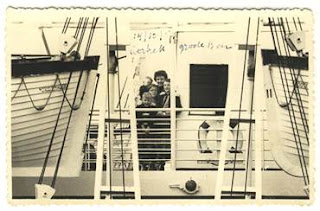From time-to-time this Blog will share stories shared from members of Friends of the Saskatchewan Archives via their "Interim Gopher" Bill Armstrong.
Cheers, Cameron
Hello FOPASKers. The gopher's invitation to share stories about the homesteading experience brought the following story from Friend Frank Korvemaker. While not strictly about homesteading, it's a great yarn. The gopher experienced Hurricane Hazel on land, and that was more than enough, thank you very much. I can't imagine what it was like with a waterline view.
Here is a photo of me – age 7, on board the Holland America Line’s “Groote Beer” (Big Bear) on Oct. 14, 1954, in Rotterdam, about to set out for Canada. Seven days later we were bobbing up, down and sideways on the mighty Atlantic, while Hurricane Hazel was throwing the last of her ferocity at anyone who got in her way. We made it safely to Montreal on Oct 24th. to begin our sojourn in Canada.
Below is a photo of the “Groote Beer” - a World War II troop carrier converted in the late 1940s into a passenger vessel. Our below deck portal was just above the water line, so when we sailed into Hurricane Hazel, and the ship lurched from side to side, we saw bright blue sky, then dark blue water. The portals were soon covered with massive metal hatches – securely bolted down. Aside from a safety issue, not seeing the sea-sky-sea-sky business over and over made the passengers feel much safer and perhaps only a wee small bit less seasick. Never been that seasick in my life – and I still have no desire to ever cross the Atlantic again in a boat. But, the sunny view as we sailed up the St. Lawrence from Quebec City to Montreal was absolutely amazing – I had never seen such fall colours before, and I would dearly like to sail that bit of waterway again some October.
Stay safe..
Bill Armstrong
interim gopher
Friends of the Saskatchewan Archives
Regina, Saskatchewan,
E-Mail: fosa.regina@gmail.com



Comments
Post a Comment